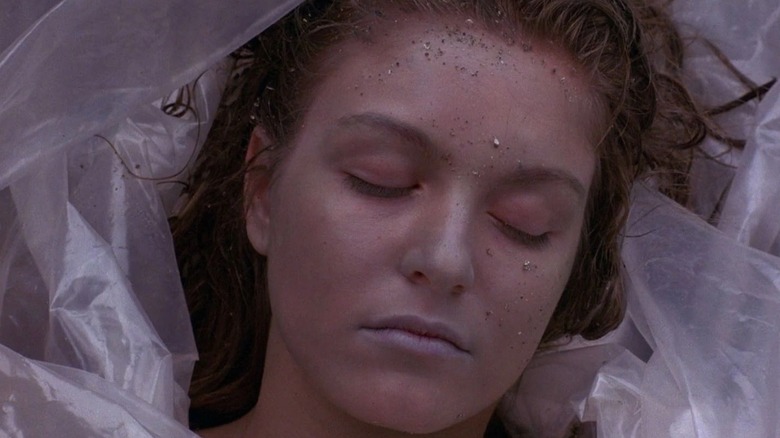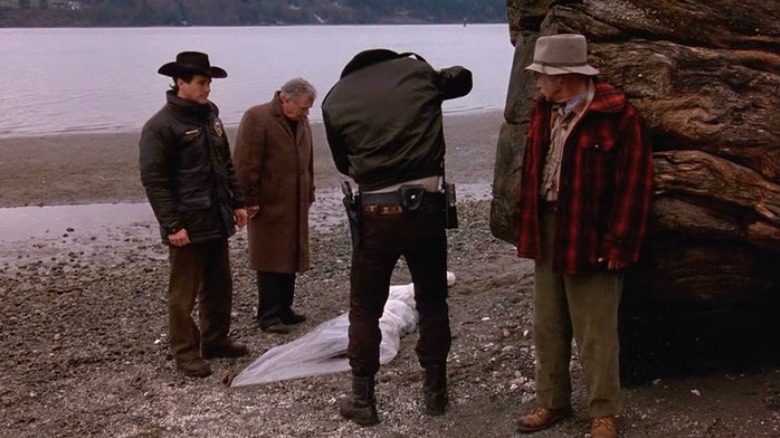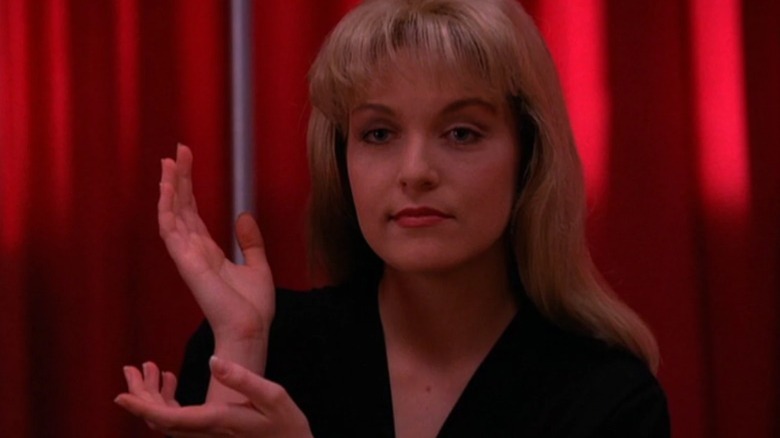The Twin Peaks Crew Put A Lot Of Work Into Laura Palmer's Corpse
Few televised images were more indelible in the early 1990s — and even still today — than that of Sheryl Lee's Laura Palmer wrapped in plastic. In the years since the series' original release, the pilot episode snapshot of the near-angelic, blue-tinged face of the dead girl at the center of "Twin Peaks" has become as ubiquitous as the school photo of the troubled teen that emblazons T-shirts and posters asking, "Who killed Laura Palmer?"
It's also an image that feels like a starting point: the Athena figure that sprung fully formed from David Lynch and Mark Frost's minds, yet didn't reveal her full self to either us or her makers until far, far later. As Willow Maclay writes in the essay "Northern Star: On Twin Peaks, Sheryl Lee, and Laura Palmer," the series' protagonist, agent Dale Cooper (Kyle MacLachlan), became "a manifestation of David Lynch's obsession of consistently returning to Twin Peaks in the desperate hope of saving the girl who began as a corpse, and slowly evolved into a messianic image of grace."
It makes sense, then, that Lynch and his team took great care to present that first, haunting image of Laura just so during filming of the series. In an oral history of Laura Palmer's story shared by Yahoo, Frost and star Lee revealed the level of detail that went into filming the pivotal scene on the Pacific Northwest beach in the show's first episode, the one in which Pete Martell (Jack Nance) memorably discovered a body "wrapped in plastic." Frost revealed that the scene was one of the first the crew ever shot, saying that the discovery of Laura is "what lights the fuse, so that felt like the best way to begin the story."
The girl wrapped in plastic
Lee remembers the shoot as something close to serene, saying, "I knew that I needed to go into the deepest state of relaxation — almost like meditation." She describes slowing her breathing down so the camera won't catch it, and working on her "state of being, or non-being." She also describes being game to take on the role of a corpse in her first meeting with Lynch, saying, " He just talked to me and put me at ease and told me about being wrapped in plastic, put in freezing cold water and painted grey. I said, 'That all sounds fine!'"
It sounds like crew members, including Lynch himself, helped make Lee's on-set experience that day positive by paying careful attention to the small details of her appearance. She told Yahoo that the plastic wrapped around her was real, meaning she needed crew members to help carry her and unwrap her during breaks. She also explained the ways Lynch added to the character's look on-set, saying:
David is such an artist, and was really involved in the image that was created, whether it was folding the plastic or placing the sand grains on my face. He's an artist in every sense of the word in all these different mediums, and they all come together in this really beautiful way.
Lynch and Lee's artistic collaboration shines through
It's true that the first image we get of Laura looks like a work of art, the sort that's so beautiful and so dead it can make a whole town fall to the ground in tears. The grains of sand on her face look more decorative than grisly, and her silvery sheen is ethereal. In the book "Approaching Twin Peaks," Rachel Joseph wrote about the way the show mingled together images of death and beauty, saying, "Laura Palmer's radiantly beautiful corpse became the primary obsession of Twin Peaks' viewing public. Trauma becomes a mystery whose nightmare is covered by the aesthetic beauty of the corpse."
It's ironic that the fateful image of Laura Palmer wrapped in plastic has become a sort of shorthand for society's fixation with beautiful, dead white women, because the character herself ended up being more complex and fully realized than anyone could have imagined that day on the beach. Several decades, one film, and 48 episode later, Lee still feels the same way about Lynch's artistry, and about his ability to bring Laura to life long after she died. "If you surrender to wherever it is he's taking you, than by the time he says action, you realize that he has taken you somewhere," she told Rue Morgue in 2014. "It's like a brushstroke that he's just painted across you."


